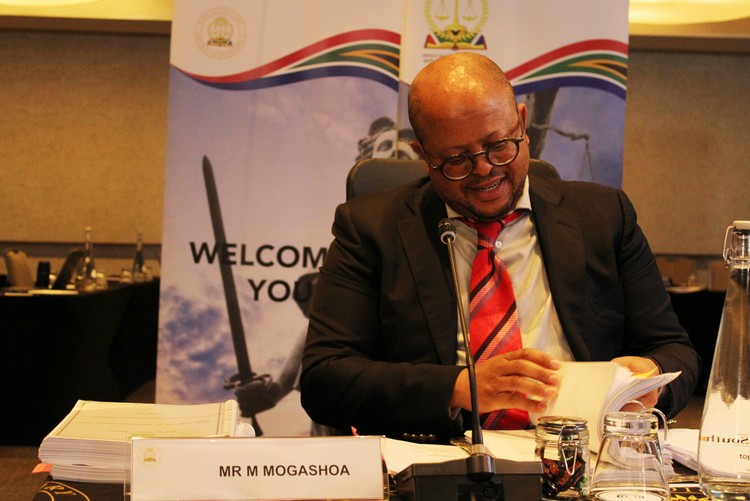
17 May 2023
Madimpe Mogashoa, an attorney who was appointed to represent the Passenger Rail Agency of South Africa (PRASA) in the Siyaya matters, testified at the tribunal of Judge Tintswalo Annah Nana Makhubele on Wednesday. Photo: Masego Mafata
PRASA employees made “major concessions” about the rail agency’s liability to the Siyaya group of companies, argued advocate Vincent Maleka on Wednesday at the Judicial Conduct Tribunal hearing in Rosebank, Johannesburg.
Judge Tintswalo Annah Nana Makhubele is facing the tribunal following a complaint lodged against her by commuter activist group #UniteBehind, related to the period she was chair of the Passenger Rail Agency’s (PRASA) interim board. The complaint was lodged with the Judicial Service Commission in 2019.
#UniteBehind claims she negotiated and entered into a confidential settlement agreement with Siyaya, a company accused of corruption, and doing so, sidelined PRASA’s internal legal team.
Makhubele’s actions in relation to Siyaya, which invoiced PRASA between 2015 and 2016 for outstanding payments, continued to be the focus of the tribunal on Wednesday. The tribunal had previously heard that it was because of concessions made by PRASA employees during an insolvency inquiry into Siyaya in 2017 that Makhubele thought PRASA should settle the Siyaya invoices.
“Evidence of the witnesses as recorded in the transcript of the inquiry reflect major concessions by witnesses who testified on PRASA’s liability to the Siyaya group of companies,” Maleka told the tribunal.
In his cross-examination of Madimpe Mogashoa of Diale Mogashoa Attorneys, who had been appointed by PRASA, Maleka took Mogashoa through the transcript of the insolvency.
The tribunal previously heard from Mogashoa that at the time of the liquidation proceedings, PRASA and Siyaya had agreed to arbitration following summonses issued by Siyaya.
Diale Mogashoa Attorneys were appointed by PRASA’s legal department to act on behalf of the rail agency in the matter.
Some PRASA employees were called to testify at the insolvency inquiry and Mogashoa said his firm was instructed by PRASA to keep a watching brief and provide feedback on proceedings.
During his testimony led by evidence leader advocate Elaine Zungu, Mogashoa said he was not aware of any concessions made by PRASA employees at the inquiry that affected the rail agency’s defence against Siyaya’s claims.
But Maleka put it to Mogashoa that PRASA employees testifying at the tribunal had conceded that there were contracts in place between Siyaya and PRASA, and that Siyaya had met its obligations but that in some instances there was no payment to Siyaya for services rendered. The amounts of the outstanding payments were included in the transcripts and read into the record by Maleka.
In response, Mogashoa said he accepted the transcripts were a record of the submissions made by PRASA employees at the insolvency inquiry, but he held a different view on whether these submissions amounted to “major concessions”.
Mogashoa said he had sent four letters he sent to Mathopo Attorneys, who represented Siyaya, outlining why PRASA did not accept liability in each of the claims heard before the inquiry. The letters were submitted as part of evidence at the tribunal on Wednesday morning.
One of the claims was that PRASA owed Siyaya about R28-million for the “rail infrastructure rehabilitation project”. Mogashoa said he had addressed this claim in one of his letters to Mathopo Attorneys, and had stated that PRASA had in fact overpaid Siyaya by about R1-million for the project.
Responding to Maleka’s query at why his report to PRASA did not make it clear what PRASA’s prospects of success in the Siyaya matter were, Mogashoa said while the report did not deal with PRASA’s prospects of success as a topic, the rail agency’s defences against Siyaya’s claims were covered at length in the report.
Retired Judge Seun Moshidi, one of the tribunal members, asked Mogashoa why his firm sent settlement offers to Siyaya’s attorneys if they believed PRASA had strong defences in the matter.
“It is not out of the ordinary that lawyers give advice and clients sometimes go against such advice,” Magashoa replied.
The tribunal resumes at 10am on Thursday.